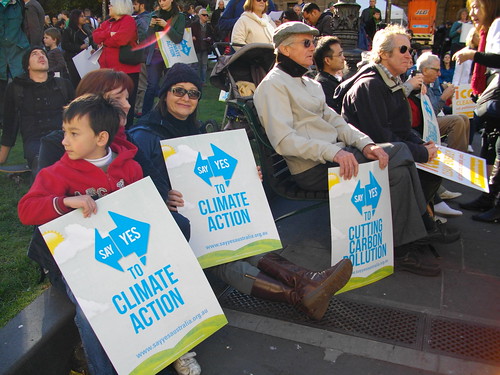Our recent discussion on the carbon tax began with an overview of the tax's development, how it's structured, and some of the responses to it.
Political context
The price on carbon is, in large part, an outcome of the current Australian minority government. Before Julia Gillard was elected she promised that she wouldn't implement a carbon tax, and would instead engage in a long period of community consultation before deciding on a course of action. The necessity of negotiating with the Greens and independents, however, shifted that plan. This is not to say that it's the Greens' plan - it's a step in the direction they want, but is far from what they would ideally like. Rural independents Rob Oakeshott and Tony Windsor have also played a role in shaping the tax, particularly by pushing for petrol to be exempted. The package is also the result of a months-long consultation process with affected industries and other groups.
Australian emissions
Another important aspect of the tax's background is Australia's carbon emissions: Australia produces more pollution per person than any other country. This is partly because Australia tends to have significantly lower levels of energy efficiency than other developed nation (in 2004, “the overall carbon efficiency of the economy, per unit of fossil fuel used, [was] about half that for Europe and Japan.” This is related, but not entirely due, to Australia's heavy dependence on coal for energy.
The structure of the plan
The details of the plan are outlined at the Clean Energy Future site. The carbon tax is currently aimed at a five percent reduction in greenhouse gas emissions by 2020, and should cover about 60% of Australia's emissions. It focuses on the 500 largest polluters (excluding the agricultural sector), with assistance packages for some industries (such as steel manufacturing). There's also significant funding included for the development of 'clean' and renewable energy, energy efficiency, and biodiversity conservation. After three years, there will be a shift to an emissions trading scheme, with a cap on carbon and a minimum price of $15 a tonne.
A significant component of the package is assistance to Australian households. Treasury modelling indicates that living costs are expected to rise by expected to rise by 0.7% in 2012-2013 (compared to the 2.5% increase associated with the GST, and the 2.9% associated with inflation). Nine in ten households will receive some money to cover this cost, with approximately two thirds of Australian households receiving enough money to cover it completely. Much of this will be provided by raising the minimum income threshold for taxation and giving tax cuts to those earning under $80,000 a year (following the recommendations of the Henry Tax Review). There will also be increases to allowances, pensions, and family payments.
Responses
Despite the limited reach of the carbon tax, opposition to it has been fierce. Much of the opposition has been lead by the Liberal party, industry groups which have launched a $10 million campaign against the tax, talkback radio, and reporting in newspapers such as the Daily Telegraph. This has been instrumental in the drop in support for the government: in July, Labor party's primary vote dropped to 26 percent, the lowest for a major party in the poll's 39-year history. There are a number of groups, including SayYes and GetUp, trying to build support for the tax, and more generally for effective climate action, but they have an uphill battle ahead.
This is a very brief overview of a complex issue. If you want to read more, one way to start is the sites I've bookmarked here - the information for this post comes from these sites.
You're also very welcome to ask questions or add comments on this post. During the discussion, we were mostly trying to understand how the tax will create change, who will be effected, and the reasons for the opposition to the tax (including opposition from those who will benefit most from the associated changes to tax and allowances). What do you think?
















